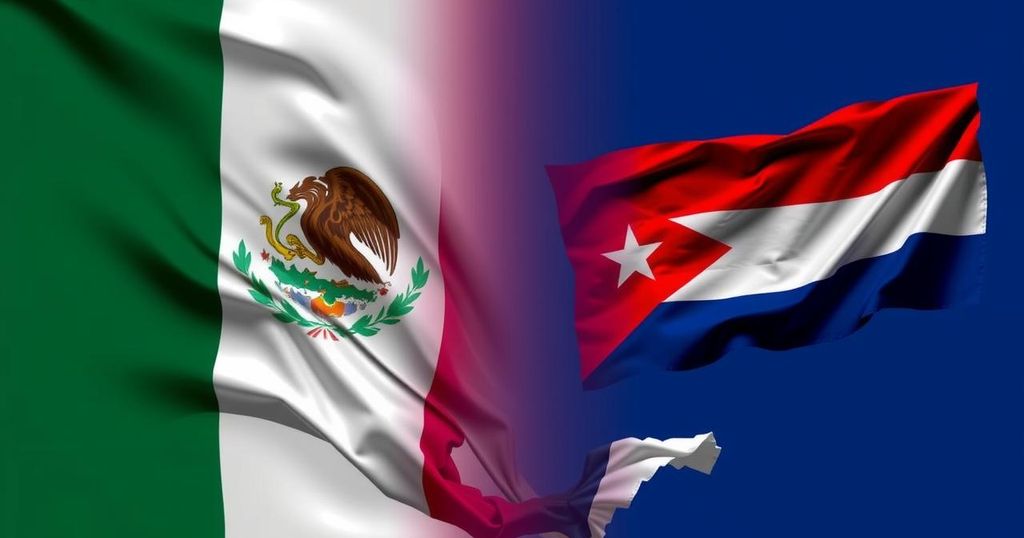Mexico’s recent support for Cuba’s dictatorship aligns it with offenders of democratic principles, such as Russia and Venezuela. This relationship follows a historical pattern of aid that Cuba has received from the Soviet Union and Venezuela. In 2023, Mexico committed to providing significant oil supplies while ignoring internal crises and failing to condition aid on the release of political prisoners in Cuba. This endorsement of an authoritarian regime raises questions about Mexico’s diplomatic integrity and commitment to democracy.
Mexico has recently aligned itself with nations such as Russia and Venezuela in its support for Cuba’s enduring dictatorship. This current support is reminiscent of past involvement from the Soviet Union, which provided Cuba with over $29 billion in aid over a span of 30 years, along with weapons, food, and technology. Following the Soviet collapse, Venezuela became Cuba’s main benefactor, specifically under the regime of Hugo Chavez, contributing an estimated $35 billion in oil assistance alone during the 1990s and early 2000s. In the contemporary context, as Venezuela grapples with its own systemic collapse, Mexico emerges as Cuba’s new vital ally, channeling substantial resources such as food, oil, and various supplies to sustain a regime characterized by its prolonged autocracy. Notably, in 2023, then-President Andrés Manuel López Obrador committed to providing 5.4 million barrels of oil to Cuba, signifying Mexico’s overt endorsement of the ongoing dictatorship that has maintained a firm grip on power for 65 years without conducting free elections. This geopolitical maneuvering raises questions regarding Mexico’s navigation of international relations, particularly in regard to its position as a primary trading partner with the United States. Mexico’s diplomacy during this period has drawn criticism; in 2023, it purportedly leveraged cooperation with the U.S. on migration issues against demands for a renewed dialogue with Cuba. Furthermore, Mexico’s refusal to attend the Summit of the Americas in 2022 stemmed from the exclusion of Cuba alongside Nicaragua and Venezuela, indicating a stark alignment with these authoritarian regimes. Internally, Mexico is contending with rising violence and a chaotic climate marked by bombings and political assassinations. Even amid its domestic turmoil, Mexico’s leadership appears focused on supporting the Cuban government instead of addressing its own precarious state. Mexico’s provision of oil and food to Cuba comes amidst a longstanding humanitarian crisis impacting both nations, highlighting a misallocation of resources contradicting any genuine support for the Cuban populace. The recent escalation of Mexico’s aid underscores the troubling reality confronting both countries. Despite official assurances of solidarity, the conditions under which such support is provided lack requirements that would promote human rights and democratic reforms in Cuba. This situation exemplifies a broader trend of nations, including Mexico, endorsing oppressive regimes under the guise of solidarity while failing to advocate for fundamental rights and freedoms.
The relationship between Mexico and Cuba has taken a significant turn in recent years, with Mexico increasingly assuming the role of Cuba’s benefactor as Venezuela’s economic crisis deepens. This dynamic revives historical patterns of support that Cuba received from the Soviet Union and Venezuela in earlier decades. The involvement of Mexico stands out due to its status as a primary trading partner of the United States and its recent diplomatic actions, which have raised eyebrows regarding its commitment to democratic values. Mexico’s provision of resources to Cuba directly challenges norms regarding support for dictatorial regimes and highlights the complexities inherent in international relations in the Americas.
The alignment of Mexico with Cuba’s dictatorship marks a troubling endorsement of authoritarianism in the region. Despite the significant challenges facing Mexico domestically, its government has prioritized support for Cuba, showcasing a preference for engaging with oppressive regimes over advocating for human rights and democratic principles. This relationship complicates Mexico’s diplomatic credibility, particularly in its interactions with the United States and other democratic nations, raising critical questions about the long-term implications for regional stability and democracy.
Original Source: thehill.com






